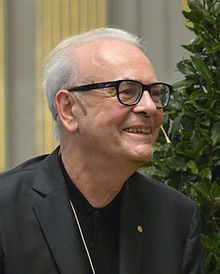Patrick Modiano
| Patrick Modiano | |
|---|---|

Patrick Modiano in Stockholm during the Swedish Academy's press conference on 6 December 2014.
|
|
| Born | Jean Patrick Modiano 30 July 1945 Boulogne-Billancourt, France |
| Occupation | Novelist |
| Language | French |
| Nationality | France |
| Ethnicity | Sephardic Jewish and Flemish |
| Genre | Novels |
| Notable awards |
Grand Prix du roman de l'Académie française (1972) Nobel Prize in Literature (2014) |
| Spouse | Dominique Zehrfuss |
| Children | Zina Modiano Marie Modiano |
Grand Prix du roman de l'Académie française (1972)
Prix Goncourt (1978)
Prix mondial Cino Del Duca (2010)
Jean Patrick Modiano (French: [ʒɑ̃ patʁik mɔdjano]; born 30 July 1945), generally known as Patrick Modiano, is a French novelist and recipient of the 2014 Nobel Prize in Literature. He previously won the 2012 Austrian State Prize for European Literature, the 2010 Prix mondial Cino Del Duca from the Institut de France for lifetime achievement, the 1978 Prix Goncourt for Rue des boutiques obscures, and the 1972 Grand Prix du roman de l'Académie française for Les Boulevards de ceinture. His works have been translated into more than 30 languages and have been celebrated in and around France, but most of his novels had not been translated into English before he was awarded the Nobel Prize.
Jean Patrick Modiano was born in Boulogne-Billancourt, a commune in the western suburbs of Paris on July 30, 1945. His father, Albert Modiano (1912–77, born in Paris), was of Italian Jewish origin; on his paternal side he was descended from a Sephardic family of Thessaloniki, Greece. His mother, Louisa Colpeyn (1918-2015), was a Belgian (Flemish) actress. Modiano's parents met in occupied Paris during World War II and began their relationship semi-clandestinely (they separated shortly after Patrick's birth). His father had refused to wear the Yellow badge and did not turn himself in when Paris Jews were rounded up for deportation to Nazi concentration camps. He was picked up in February 1942, and narrowly missed being deported, after an intervention from a friend. During the war years Albert did business on the black market, hanging around with the Carlingue, the French Gestapo auxiliaries. Its leaders were recruited from the underworld. Albert Modiano never clearly spoke of this period to his son before his death in 1977.
...
Wikipedia
